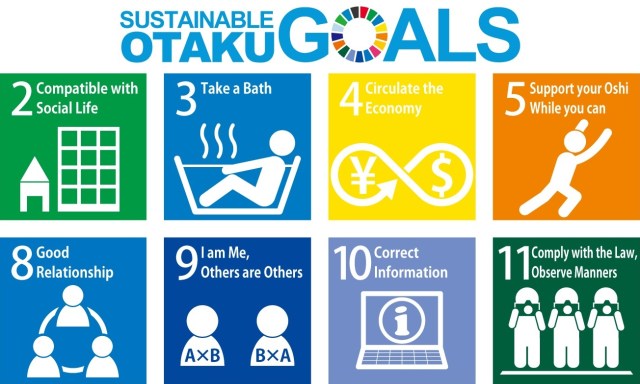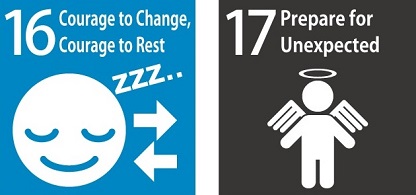
And also to avoid becoming the reason for someone else’s burnout.
One of the big differences between being an otaku and just an ordinary fan is that the former implies a significantly higher level of interest. But while that intense passion can make being an otaku emotionally rewarding in the short-term, it’s not always a lifestyle that you can keep on living indefinitely, with burnout, collapse of enthusiast communities, or other problems having the potential to spoil the fun and cause otaku to walk away from their hobby.
To prevent that sad turn of events, Japanese Twitter user @t_shigeno has created a list of 17 SOGs, or Sustainable Otaku Goals. The purpose of the SOGs is to outline what otaku need to do, both for themselves and others, to keep their fandom viable.
SOGs(Sustainable OTAKU Goals/持続可能なオタク目標)
— しげの%次は4/27(土)おもバザ@ベルサール秋葉原 (@t_shigeno) December 22, 2021
暫定11項目に対していただいたご意見を踏まえ、17項目に追加・アップデートしました。 #SOGs pic.twitter.com/KFHiTBqC2m
And with otaku-ism no longer confined to just Japan, @t_shigeno has also posted an English version of the Sustainable Otaku Goals.
SOGs(Sustainable OTAKU Goals/持続可能なオタク目標)英語版・修正版です。
— しげの%次は4/27(土)おもバザ@ベルサール秋葉原 (@t_shigeno) December 27, 2021
SOGs(Sustainable OTAKU Goals) English version(Revised). #SOGs
いただいたご指摘を踏まえ、英文を修正しました。
Revised based on @MCEscher68 @beaniebeancakes pic.twitter.com/CEsEKLllDY
The list starts off with three objectives that aren’t direct parts of being a fan, but are still critical life functions some otaku forget to observe, “No health, no life” is a call to take care of your physical health, since while you might be spending a lot of time watching anime or playing games in a 2-D realm, you need to look after your real-world body. “Compatible with social life” is a reminder to be a responsible and active member of society as a whole, not just within the microcosm fan society. “Take a bath,” of course, is self-explanatory, so its inclusion is less of an eye-opener and more of plea to not force others to pinch their noses when you’re around.
Next up are three spending-habit SOGs. If you like consuming entertainment media, it’s important to economically contribute to its creation, but also to do so to an extent that’s appropriate to your financial situation, and not blowing your grocery money on limited-edition merch, no matter how cool those special items may be. We’ve also got a mention supporting your oshi, used here in the sense of one’s favorite idol, voice actor, or other performer. The “while you can” is critical to keep in mind, since a lot of otaku-oriented performers have very short careers, which can be cut down to even less if they’re not receiving fan support.
SOG 7 seems like it should be obvious, but sometimes the amount of time and emotion that otaku invest in their hobby can cause them to lose sight of the fact that hobbies are supposed to be fun, and once they stop being fun, it’s only a matter of time until burnout sets in. It’s not only your own personal enjoyment you need to look out for, though. Doing your best to friendly and polite to fellow fans, and cordially agreeing to disagree about things like your preferred character couplings, will go a long way towards making sure other enthusiasts can continue to be otaku too.
We come to some more modern aspects of otaku-ism here. While the vast amount of knowledge available to anyone with an internet connection can help encourage engaging and lively discussions, inaccurate information can lead to all sorts of problems, especially if it’s used to mount a both-guns-blazing flame war with someone who isn’t actually in the wrong at all. Point 11 relates to otaku-ism now being much more of an outside-the-home thing than it used to be, with an unprecedented number of conventions, fan events, and location pilgrimages, refraining from encroaching on others’ personal space and private property are points of etiquette otaku need to be mindful of, lest such events and gatherings start being cancelled or banned. And with there now being decades’ worth of otaku media, preserving older items in good condition becomes increasingly important, since some of those relics of the otaku legacy can no longer be replaced.
“Not only consume, but provide” might seem like it’s already been covered under SOG 4, “Circulate the economy.” As evidenced by the Wi-Fi-like lines radiating out from the otaku silhouette, though, this is about the input and output of ideas, with the implication being that fandom thrives on such exchanges. Since such exchanges also carry the possibility of disagreements, though, it’s important to be able to think about both yourself and others in a calm and composed manner.
Wrapping things up, similar to SOG 1’s advice to take care of yourself, don’t forget that sometimes the best course of action is to take a step back and take a nap, or do whatever else is necessary for your body and mind to rest and recharge. Finally, and this is actually sound advice for building any sort of sustainable system, make sure to have some backup plans in place in case things don’t go exactly as you thought they were going to, plus give yourself enough leeway to see your personal Plan B (or C or D) through.
The Sustainable Otaku Goals sound like a smart plan to Japanese Twitter commenters, who’ve responded to the list and pictographs with:
“A wonderful set of guidelines.”
“Can’t disagree with any of these.”
“I can only hit the ‘like’ button once, but I’d really like to do it a hundred times.”
“As an otaku, I hope to achieve all of these goals.”
“Saving this, and making them my family mottos.”
“These aren’t just necessary for otaku to follow, but for all people in modern society.”
As mentioned by the last commenter, many of the Sustainable Otaku Goals are applicable to a lot of other lifestyles as well, but they’re especially pertinent for otaku. With Comiket just around the corner, the list makes for a nice refresher too, and those looking for a little extra help in good otaku citizenship might also want to consider picking up an anti-embarrassment bag while at the event.
Source: Twitter/@t_shigeno via IT Media
Top image: Twitter/@t_shigeno
Insert images: Twitter/@t_shigeno
● Want to hear about SoraNews24’s latest articles as soon as they’re published? Follow us on Facebook and Twitter!







 Adult otaku reflects on why it’s now easier for Japanese anime fans to be open about their hobby
Adult otaku reflects on why it’s now easier for Japanese anime fans to be open about their hobby The reason why the best spouse for an otaku might not be another otaku
The reason why the best spouse for an otaku might not be another otaku The one thing otaku never take photos of on vacation, according to Japanese Twitter
The one thing otaku never take photos of on vacation, according to Japanese Twitter 10 signs you might not be an otaku anymore
10 signs you might not be an otaku anymore Otaku dating service advises singles to have interests other than anime
Otaku dating service advises singles to have interests other than anime Foreigner’s request for help in Tokyo makes us sad for the state of society
Foreigner’s request for help in Tokyo makes us sad for the state of society Japanese-style accommodation at the new Premium Dormy Inn hotel in Asakusa will blow your mind
Japanese-style accommodation at the new Premium Dormy Inn hotel in Asakusa will blow your mind Seaside scenery, history, and so many desserts on Yokohama’s Akai Kutsu【Japan Loop Buses】
Seaside scenery, history, and so many desserts on Yokohama’s Akai Kutsu【Japan Loop Buses】 Mikado Coffee is a 76-year-old coffee chain with a major celebrity connection
Mikado Coffee is a 76-year-old coffee chain with a major celebrity connection Japanese city loses residents’ personal data, which was on paper being transported on a windy day
Japanese city loses residents’ personal data, which was on paper being transported on a windy day Japan’s summertime towelket pillowcases are even better with the addition of Ghibli stars【Photos】
Japan’s summertime towelket pillowcases are even better with the addition of Ghibli stars【Photos】 The results are in! One Piece World Top 100 characters chosen in global poll
The results are in! One Piece World Top 100 characters chosen in global poll Japan’s first-ever capybara cat cafe opens in Tokyo
Japan’s first-ever capybara cat cafe opens in Tokyo Former employee shows us why a Starbucks “Tall Latte” is a sucker bet
Former employee shows us why a Starbucks “Tall Latte” is a sucker bet Cockroach-Killer Spider (aka Fighting Nope with More Nope)
Cockroach-Killer Spider (aka Fighting Nope with More Nope) McDonald’s new Happy Meals offer up cute and practical Sanrio lifestyle goods
McDonald’s new Happy Meals offer up cute and practical Sanrio lifestyle goods Japanese ramen restaurants under pressure from new yen banknotes
Japanese ramen restaurants under pressure from new yen banknotes French Fries Bread in Tokyo’s Shibuya becomes a hit on social media
French Fries Bread in Tokyo’s Shibuya becomes a hit on social media Red light district sushi restaurant in Tokyo shows us just how wrong we were about it
Red light district sushi restaurant in Tokyo shows us just how wrong we were about it New private rooms on Tokaido Shinkansen change the way we travel from Tokyo to Kyoto
New private rooms on Tokaido Shinkansen change the way we travel from Tokyo to Kyoto Tokyo Tsukiji fish market site to be redeveloped with 50,000-seat stadium, hotel, shopping center
Tokyo Tsukiji fish market site to be redeveloped with 50,000-seat stadium, hotel, shopping center Beautiful Ghibli sealing wax kits let you create accessories and elegant letter decorations【Pics】
Beautiful Ghibli sealing wax kits let you create accessories and elegant letter decorations【Pics】 Secret Kitchen bento serves Japanese flowers, birds, wind and moon in a box, but is it worth it?
Secret Kitchen bento serves Japanese flowers, birds, wind and moon in a box, but is it worth it? New definition of “Japanese whiskey” goes into effect to prevent fakes from fooling overseas buyers
New definition of “Japanese whiskey” goes into effect to prevent fakes from fooling overseas buyers Our Japanese reporter visits Costco in the U.S., finds super American and very Japanese things
Our Japanese reporter visits Costco in the U.S., finds super American and very Japanese things Studio Ghibli releases Kiki’s Delivery Service chocolate cake pouches in Japan
Studio Ghibli releases Kiki’s Delivery Service chocolate cake pouches in Japan All-you-can-drink Starbucks and amazing views part of Tokyo’s new 170 meter-high sky lounge
All-you-can-drink Starbucks and amazing views part of Tokyo’s new 170 meter-high sky lounge More foreign tourists than ever before in history visited Japan last month
More foreign tourists than ever before in history visited Japan last month New Pokémon cakes let you eat your way through Pikachu and all the Eevee evolutions
New Pokémon cakes let you eat your way through Pikachu and all the Eevee evolutions Disney princesses get official manga makeovers for Manga Princess Cafe opening in Tokyo
Disney princesses get official manga makeovers for Manga Princess Cafe opening in Tokyo Sales of Japan’s most convenient train ticket/shopping payment cards suspended indefinitely
Sales of Japan’s most convenient train ticket/shopping payment cards suspended indefinitely Sold-out Studio Ghibli desktop humidifiers are back so Totoro can help you through the dry season
Sold-out Studio Ghibli desktop humidifiers are back so Totoro can help you through the dry season Japanese government to make first change to romanization spelling rules since the 1950s
Japanese government to make first change to romanization spelling rules since the 1950s Ghibli founders Toshio Suzuki and Hayao Miyazaki contribute to Japanese whisky Totoro label design
Ghibli founders Toshio Suzuki and Hayao Miyazaki contribute to Japanese whisky Totoro label design Doraemon found buried at sea as scene from 1993 anime becomes real life【Photos】
Doraemon found buried at sea as scene from 1993 anime becomes real life【Photos】 Tokyo’s most famous Starbucks is closed
Tokyo’s most famous Starbucks is closed One Piece characters’ nationalities revealed, but fans have mixed opinions
One Piece characters’ nationalities revealed, but fans have mixed opinions We asked a Uniqlo employee what four things we should buy and their suggestions didn’t disappoint
We asked a Uniqlo employee what four things we should buy and their suggestions didn’t disappoint Otaku Lovers: Japan’s new singles event that’s just for hardcore anime and video game fans
Otaku Lovers: Japan’s new singles event that’s just for hardcore anime and video game fans Support your faves and avoid oshikatsu burnout — advice from our resident otaku
Support your faves and avoid oshikatsu burnout — advice from our resident otaku According to this encyclopedia of Japanese otaku fashion, which one are you?
According to this encyclopedia of Japanese otaku fashion, which one are you? Eight reasons otaku men are unpopular with women, according to Japanese Twitter list
Eight reasons otaku men are unpopular with women, according to Japanese Twitter list “Otaku are the biggest suckers” says Pokémon artist
“Otaku are the biggest suckers” says Pokémon artist The pitfalls of inter-otaku conversation, turns out it’s no better than with non-otaku
The pitfalls of inter-otaku conversation, turns out it’s no better than with non-otaku Japanese women rank the otaku obsessions they can most forgive in a partner
Japanese women rank the otaku obsessions they can most forgive in a partner Seven reasons why an otaku should date another otaku (and one reason maybe not to)
Seven reasons why an otaku should date another otaku (and one reason maybe not to) Here’s why the home of an otaku is a great place to be during a blackout
Here’s why the home of an otaku is a great place to be during a blackout Anime matchmaking comes to America with Otaku Speed Dating
Anime matchmaking comes to America with Otaku Speed Dating No boys allowed! Take a look inside Japan’s first cafe for female otaku ONLY
No boys allowed! Take a look inside Japan’s first cafe for female otaku ONLY Biannual Comiket otaku migration attracts a predator for the first time 【Video】
Biannual Comiket otaku migration attracts a predator for the first time 【Video】 Could you marry an otaku? Japanese people rank the geek hobbies they’d let slide for love
Could you marry an otaku? Japanese people rank the geek hobbies they’d let slide for love
Leave a Reply